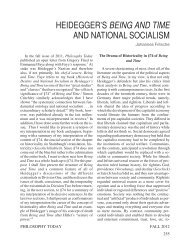SPINOZA'S VIRTUOUS PASSIONS
SPINOZA'S VIRTUOUS PASSIONS
SPINOZA'S VIRTUOUS PASSIONS
Create successful ePaper yourself
Turn your PDF publications into a flip-book with our unique Google optimized e-Paper software.
782 MATTHEW J. KISNER<br />
alone provide us with knowledge about our perfection and thus the<br />
feedback which makes it possible for us to act in accordance with reason.<br />
Since Spinoza’s notion of true virtue involves a disposition to act<br />
consistently in accordance with reason, it follows that the passions<br />
play an integral and positive role in the virtuous life. 48<br />
This point helps us to see how Spinoza’s moral philosophy breaks<br />
starkly with the Stoics. For the Stoics, the passions are mistakes of<br />
reason, failures to follow logos. Consequently, they see the sage, one<br />
who is completely free from the passions, as obviously desirable.<br />
Moreover, for them there is nothing incoherent about the possibility<br />
of such a person, though Stoics admit that there have been few if any<br />
sages. In contrast, Spinoza’s understanding of reason is much narrower<br />
than the Stoics’, limited only to having a few, general adequate<br />
ideas. While Spinoza agrees with the Stoics that the passions are<br />
epistemically inferior, he cannot make sense of the notion that someone<br />
can function entirely through reason and, consequently, it would<br />
be incoherent for him to uphold apatheia as a realistic ethical goal.<br />
The result is a philosophy which is far more attentive to the irrational<br />
and affective aspects of human life, a philosophy which is more understanding<br />
of human passivity, vulnerability, and dependence.<br />
While it is widely recognized that Spinoza criticizes the Stoics for<br />
imagining that it is possible for humans to completely master the passions,<br />
it is nevertheless common to see Spinoza as Stoic in the sense<br />
that he desires to eliminate the passions as much as possible. On this<br />
view, passions are, at best, necessarily evils. While it is true that<br />
Spinoza wants to reduce the causal power that external things exert<br />
over us and, consequently, reduce the causal power of the passions,<br />
this paper has shown that is not the case that Spinoza sees the passions<br />
as necessarily bad or that he wants us to eliminate the passions.<br />
On this reading, Spinoza’s assertions of our passivity are not necessarily<br />
the “darkest” and most “pessimistic” part of the Ethics. 49 Rather,<br />
48<br />
It may be tempting to conclude that the passions are necessary for a<br />
virtuous life only in the weak sense that they are necessary for any life at all.<br />
This would put them on the same level as food and shelter: necessary for a<br />
moral life, though without any moral significance. Although the passions are<br />
necessary for a virtuous life in this weak sense, unlike food and shelter, the<br />
passions are uniquely constituted to contribute positively to a virtuous life,<br />
providing us with the sort of information that is necessary in order to act in<br />
accordance with reason, thereby contributing to a proper character.<br />
49<br />
“Action and Passion,” 345.
















